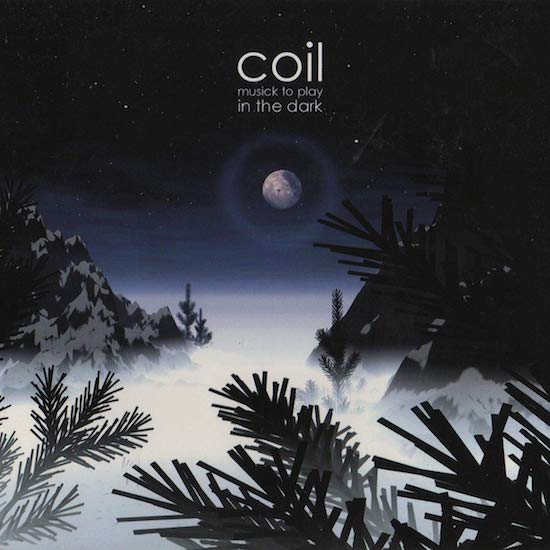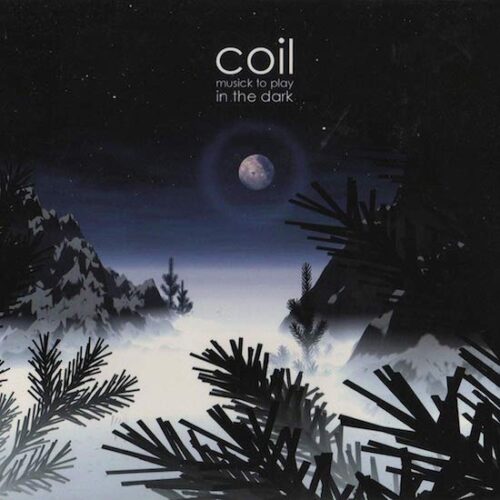Coil’s lunar phase began in London, where they would trace the hidden rivers of the city buried under mounds of concrete.
On late-night expeditions along the Thames, John Balance and Peter ‘Sleazy’ Christopherson would notice the moon reflected upon the restless tidal flow. This prompted the pair to take stock of the colossal influence one had on the other.
By the time of their migration to the seaside town Weston-Super-Mare, this lunar phase was fully-fledged, a hermetic existence divorced from the chaos and speed of London life. A new coastal environment intensified their relationship with both moon and water. At night their cliffside home bathed in light, surrounded by a vast ocean, unobstructed by neither smog nor skyscraper. This was a place which birthed a wholly new Coil, particularly on 1999’s aptly named Musick To Play In The Dark.
Vocals once screeched became coolly intoned, more of a breathy whisper. Likewise, the music, once carnal, full of aggro and ecstasy, gave way to something much more ‘reflective’. Though ever-present, Coil’s famed exploration of the English landscape really came to the fore in this setting, as did an interest in the visionary artists whom over the years have inhabited it.
Much of their previous ‘solar’ work was marked by a consciously ‘pan-cultural’ approach, as on the album Horse Rotorvator, where the theme of death is tackled in the context of the AIDS crisis, and is driven by a fascination with the Mexican Day Of The Dead as well as persistent references to Rome.
As has been pointed out elsewhere, Horse Rotorvator wears its aesthetic influences on its sleeve: and these include pagan roman beliefs, decadence and death. On ‘Slur’, Balance sings of "Roman land, of Roman sands, and Roman sons," while ‘Ostia (The Death Of Pasolini)’, plunges you "into the sea, the sea of Rome," the skies above an apocalyptic red, blood the only moisture in the soil.
Industrial music documentary The Sound Of Progress displays the group at their Chiswick home around the time of Horse Rotorvator. Mid chat they enjoy a gluttonous Roman-esque feast; their faces are smeared in grease, their fingers are in each other’s mouths, there are mountains of food torn apart with bare hands. Like the music at that time – with its war-ready, militant rhythms, and portentous samples conjuring images of vast colosseums – what’s presented is a life of ravenous excess.
Travel forward to a television interview for Hello Culture at their Somerset home, and you find a very different Coil, one who between questions take slow sips from cups of nettle tea. As Ian Penman wrote in The Wire, this place provided "sky and silence for alms, in place of their old penitent’s diet of speed and crash and cock and burn," – or, as Balance later said in that feature, it was time to shed ties with their ’80s work, "all metal bashing and sampled chaos and everyone tied up in leather."
One of the primary motivations for this move was allegedly to distance themselves from the ready indulgences of London, and it manifests in the music itself. Throughout Musick To Play In The Dark (and its Vol. 2 follow up released the following year), each tool in Coil’s arsenal is flipped on its head. Gone is any sense of gladiatorial brute force.
Even the group’s approach to sex and lust becomes irreversibly altered. Where ‘The Anal Staircase’ demanded to "blow the fucking thing apart," in its place there’s a much more subdued music, as on Black Antler’s ‘Sex With Sun Ra’, or The Ape of Naples‘ take on earlier track ‘Teenage Lighting’.
Musick To Play In The Dark opener ‘Are You Shivering?’ is perhaps the most curious example, the ultimate sound of late-night gurns and imminent comedowns, somehow both asexual and hyper-sexual. It chronicles the tail end of an MDMA binge. A pair lay together simultaneously weary and wide awake, and experience the last tingles of the drug while the moon’s beams take on a tangible omnipresence. "In the oceans of the moon," sings Balance, "swimming squidlike and squalid, this bright moon is a liquid, this dark earth is a solid," a mantra for this new lunar sensuality.
During the pair’s extensive conversation with Penman, Balance spoke of how they "decided to go from the solar to the lunar aspect. We just decided to become completely open to whatever happens: make more reflective music. It seems a logical step… moon music." Not content to simply allow in the moon’s influence, the idiosyncrasies of the West Country also seep into the group’s sound.
It’s a peculiar part of England, with a prominent interest in all things inexplicable, be that witchcraft, astrology, or most notoriously crop circles. There’s the town Pewsey, located in Somerset’s neighbour county Wiltshire and proud to hold the Crop Circle Exhibition & Information Centre. Even look to Danny Dyer’s BBC documentary I Believe In UFOs, where the self-professed "young cockney who wants to believe" visits rural pub The Barge In and finds its walls covered in photos, newspaper snippets, and every inch of the ceiling full of elaborate artwork, all centred around crop circles.
Imagery of UFOs feature on 1998’s Astral Disaster, and on Musick To Play In The Dark‘s ‘Red Birds Will Fly Out Of The East And Destroy Paris In A Night’, Coil seem to openly embrace this territory with some straight-faced cosmic space travel. It’s a respite from the album’s more languid sounds, with wildly oscillating progressive synths at once naff and kaleidoscopic, Tangerine Dream worship but hijacked by frenzied spurts of noise.
They also share a connection to Julian Cope. A link via Thighpulsandra, and through Cope’s indispensable The Modern Antiquarian, an extensive study of Britain’s megalithic sites. Like Cope, Coil would go on pilgrimages to these relics of a much older, less familiar Britain, and draw inspiration from their ancient acts of ritual, Coil’s own music undoubtedly an act of ritualistic creation itself.
David Keenan’s England’s Hidden Reverse, which chronicles the overlapping careers of Coil, Nurse With Wound and Current 93, contains a picture of Balance in the middle of one of these pilgrimages, stood at the top of Glastonbury Tor. It’s a remarkable site in and of itself, but especially for those with belief in the power of ley lines, as well as ancient Christian myths. The most outlandish but well-known claim is that as a child, Jesus came to the location of Glastonbury Tor with Joseph Of Arimathea, the building allegedly built to house the Holy Grail – hence William Blake’s question in ‘Jerusalem’: "And did those feet in ancient time walk upon England’s mountains green?"
The area is a hotbed for this kind of activity. Both Stonehenge and Avebury’s Neolithic stone circle are only a short drive away, not to mention the numerous lesser-known examples. Coil immersed themselves in it all, their art one of full engagement. Like Sleazy said to Keenan, "That’s partly us reacting to our environment and partly us stripping away the layers of immediate history and getting to something deeper."
It would be a lie to characterise this land as wholly receptive to an English mystic spirit. After all, travel a short distance eastward and you’ll find a region willing to elect uber-Brexiteer-rotter Jacob Rees Mogg. Truth be told, it’s a place of mixed ideals, particularly due to some toxic anti-traveller sentiments, over a decade prior to Coil’s move, there being the infamous confrontation between the police and a large number of new-age travellers at Stonehenge.
When looked at from a certain angle, Coil’s inhabitancy of this place makes perfect sense, a region where the conservative English authority and stuffy nostalgists alike, waged war with those who had very different ideas about the essence of England and the ownership of land. On a conceptual level, there is a real pleasure to imagine Coil above a craggy, Jurassic cliff face, channelling ancient nocturnal spirits while just down the road it’s all fading Victorian piers and crazy golf.
The isolation of their Weston-Super-Mare home did however prove to exacerbate Balance’s increasingly debilitating alcoholism. "I also think Balance gets bored and drinks more," Rose McDowall of Strawberry Switchblade told Keenan, adding: "it’s very painful to see what he is doing to himself." This spiralling issue eventually led to his death in 2004, where in a drunken state he fell from the two-storey balcony of his and Christopherson’s home.
This Weston home was evidently a place of great artistic inspiration but on a personal level allowed room to fuel even more destructive impulses. On ‘Broccoli’, you can hear a moment of harmony with their environment, one of the key tracks to unlock the magick of Musick To Play In The Dark.
It exists in the murky hinterland between late night and early morn. Solar Coil could be described reasonably to have a ‘pan-cultural’ sound, where at this lunar juncture they seem to draw almost exclusively from English sources. Where once they reached out, now they surrender entirely to the logic of their chosen landscape.
Sleazy sings this faltered, childlike refrain, "eat your greens, especially broccoli," over a convergence between the natural and the artificial, this synthetic folksy lullaby. On one level it’s a highly specific England, a homely, wholesome, nostalgic one, but Balance’s lyrics tap into something deeper, stranger, supposedly a spiritual communion between himself, his deceased grandfather, and the English artist and occultist Austin Osman Spare. With both Musick To Play In The Dark and especially ‘Broccoli’, Coil have cast a spell, and in doing so make the landscape infinite.



